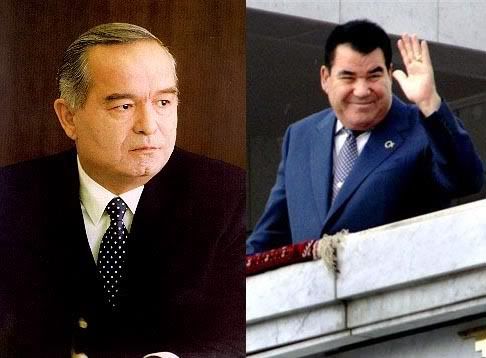How Will Uzbekistan Handle Succession?: Reverberations from Turkmenbashi’s Death

When Turkmenbashi passed away under a cloud of secrecy in Ashghabad in late December, one can assume that the other Central Asian presidents thought long and hard about what would happen if they experienced a similar heart failure, whether naturally or induced. Given Kazakhstan’s relative stability, Rakhmanov’s young age, and Bakiyev’s numerous other political problems, events in Ashghabad probably scared Islam Karimov more than it did the others.
The relatively murky succession of Turkmenbashi brings up many questions for Karimov. First, the question of whether Turkmenbashi’s death was a natural result of hard living or a part of a palace coup likely occupies the minds of autocratic leaders throughout the region, but it is especially worrisome for Karimov whose security organs are the most empowered in Central Asia. Second, the absence of Niyazov’s family in discussions related to December’s quick succession in Turkmenistan must make Karimov wonder about the position of his own family once he has left the scene. Obviously, Gulnara is more powerful in Uzbekistan than any of Niyazov’s family was in Turkmenistan. She is also, however, less popular in the public eye. Finally, the speculation about the seemingly pre-meditated role of Turkmenistan’s security organs in quickly and smoothly managing Turkmenbashi’s succession must lead Karimov to think more seriously about what plans Uzbekistan’s more expansive security apparatus might have for handling his eventual passing.
Perhaps this is why President Karimov has been silent about the next presidential elections in Uzbekistan despite the fact that his term (by one reading of the laws) has already ended. While he has the same convoluted constitutional justification as did Nazarbayev to prolong his rule another year if he wishes, Karimov has not even gone through the pro-forma actions of justifying such a move by creating a staged discussion in parliament. Rather, he has chosen to ignore the issue of elections all together for now. Even if he had intended to schedule a shot-gun surprise election for himself as did Nazarbayev in December 2005, events in Turkmenistan may have made him think twice.
Assuming that Islam Karimov will choose to stay in power until his health falters as did Niyazov, however, the question of succession in Uzbekistan is less worrisome to him than it is to the rest of the world. With a population more than five-times the size of Turkmenistan’s, an active and angry radical Muslim opposition in exile, and not nearly the per capita natural resources of Turkmenistan, Uzbekistan’s presidential succession is unlikely to be handled as smoothly as was the case in Ashghabad in late December. Furthermore, the power structure within the military and security structure of Uzbekistan has often been rumored to be more splintered than in Turkmenistan, and it is definitely better armed. If Turkmenistan’s succession seems thus far to be a relatively copasetic agreement between a few power brokers in a smoky room over cognac, Uzbekistan’s transition in leadership could look much messier.
And, the messiness would probably not stop at the borders of Uzbekistan. Instability in Uzbekistan would likely become a major issue for all of its bordering countries. If a power struggle were to turn violent, for example, Kyrgyzstan, Tajikistan, and Turkmenistan could have difficulties protecting their borders. Likewise, if instability led to a refugee situation, these three countries and Kazakhstan as well would be hard pressed to deal with large numbers of Uzbek citizens spilling over their borders.
Of course, as somebody mentioned in a forum where this was discussed last week, the elite of Uzbekistan may already have lined up a consensus for succession. But, if they haven’t, Uzbekistan’s leadership transition could create havoc throughout the region. Thus far, there are no signs that Islam Karimov is dealing with these issues, but one has to believe that he is thinking about them. If he isn’t, others, both inside and outside of Uzbeksitan, certainly are.



1 Comments:
http://blacklarks.blogspot.com/2013/05/first-week.html?showComment=1426333407570#c2232864380943417649
Post a Comment
<< Home